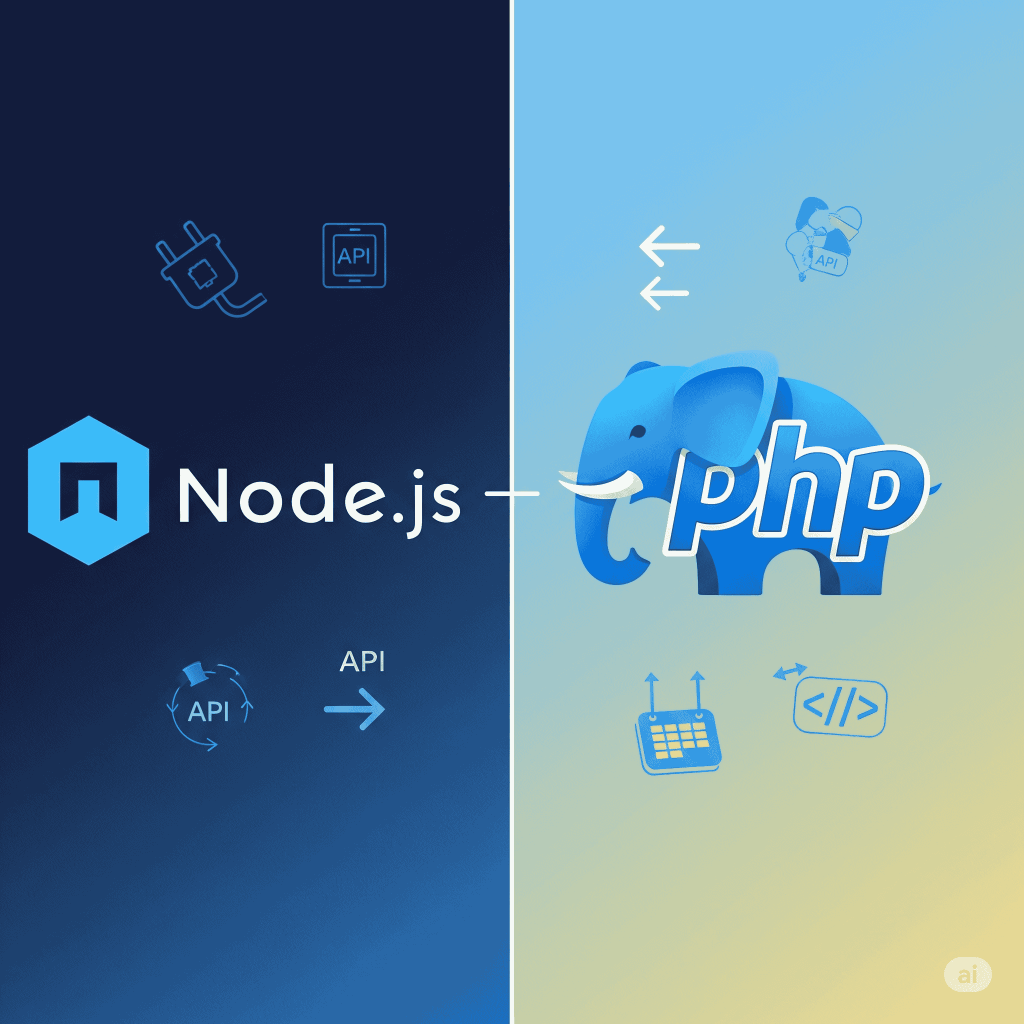Introduction
APIs are the backbone of modern web and mobile applications. They connect your frontend, backend, and third-party services seamlessly. While PHP has been a long-time favorite for server-side scripting, Node.js has emerged as the preferred choice for API development.
In this article, we’ll compare Node.js vs PHP for API development and explain why Node.js is winning the race for businesses that want performance, scalability, and flexibility.
| Feature | PHP | Node.js |
|---|---|---|
| Language | Runs on PHP (server-side only) | Runs on JavaScript (full-stack: frontend + backend) |
| Concurrency | Blocking, synchronous by default | Non-blocking, event-driven I/O |
| Performance | Slower for high concurrent requests | Faster, handles 10k+ concurrent connections |
| Ecosystem | Mature but older | Modern, huge npm ecosystem |
| API Development | Requires frameworks like Laravel | Native support for REST & GraphQL APIs |
| Scalability | Vertical scaling mostly | Horizontal scaling with microservices |
⚡ Why Node.js is Better for API Development
1. Performance & Speed
- Node.js uses Google’s V8 engine for lightning-fast execution.
- Non-blocking architecture handles thousands of concurrent API requests.
- PHP, on the other hand, processes requests synchronously, making it slower for real-time apps.
2. Scalability
- Node.js is built for microservices & distributed systems.
- APIs can be scaled horizontally across servers with ease.
- PHP apps often rely on vertical scaling, which can be costly.
3. Full-Stack JavaScript
- Node.js allows frontend (React, Vue, Angular) + backend (Express.js) development in one language – JavaScript.
- PHP requires switching between PHP (backend) and JS (frontend).
4. Real-Time Applications
- Node.js is perfect for real-time APIs (chat apps, live streaming, IoT).
- PHP needs additional tools like WebSockets server for real-time support.
5. Huge Ecosystem with npm
- Node.js has 1M+ npm packages for APIs, integrations, and utilities.
- Example: Express.js, NestJS, Fastify make API development fast & modular.
- PHP has Composer, but its ecosystem is smaller compared to npm.
6. Better Developer Experience
- JavaScript developers can easily transition into backend development.
- Faster development cycles with npm + modern JS frameworks.
🛠️ Example: Simple API in Node.js vs PHP
Node.js (Express.js)
const express = require("express");
const app = express();
app.get("/api/users", (req, res) => {
res.json([{ id: 1, name: "Naveen" }, { id: 2, name: "Rahul" }]);
});
app.listen(3000, () => console.log("API running on port 3000"));
PHP (Laravel)
Route::get('/api/users', function () {
return response()->json([
['id' => 1, 'name' => 'Naveen'],
['id' => 2, 'name' => 'Rahul']
]);
});
Both work, but Node.js APIs scale better for high-traffic applications.
📌 Real-World Use Case
- Netflix migrated from PHP to Node.js.
- Result: API response time reduced by 70%.
- They handled high concurrent requests with Node’s non-blocking model.
✅ Best Practices for Node.js API Development
- Use Express.js or NestJS for structured development.
- Implement JWT authentication for secure APIs.
- Use MongoDB/PostgreSQL with ORMs like Mongoose or Prisma.
- Add API documentation with Swagger/OpenAPI.
- Monitor performance with PM2 or Docker.
📝 Conclusion
While PHP is reliable for traditional web apps, Node.js clearly leads in API development thanks to its speed, scalability, and ecosystem.
If you’re building modern APIs for mobile apps, SaaS platforms, or real-time services, Node.js is the smarter choice.



